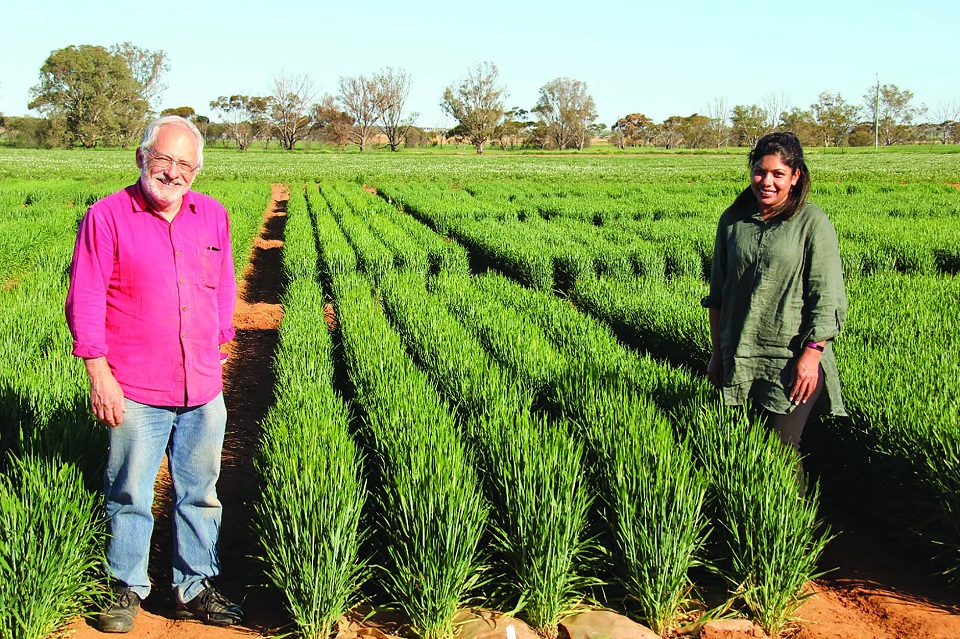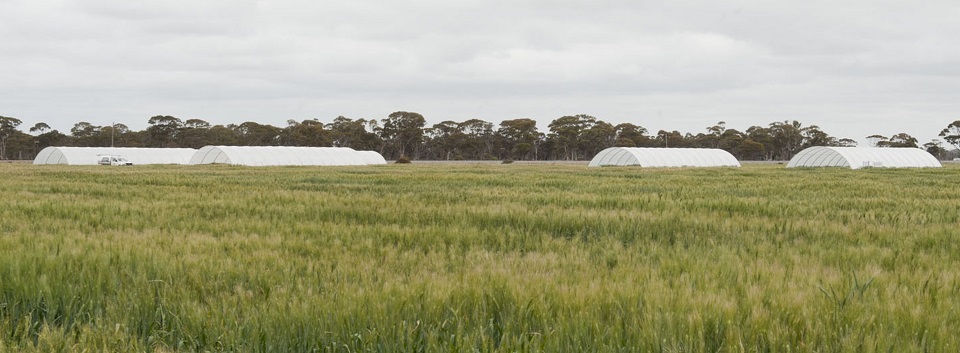The Merredin Dryland Research Institute provides broad grains research and development capacity, with facilities including near infrared analysis of grain quality, fully controlled glasshouses, modern laboratories, 600 hectare (ha) field trial area including irrigated trial areas, network of digital soil moisture probes and weather stations, and an engineering workshop.
The facilities, which cover 1165 ha located 5 km west of Merredin in the low rainfall, eastern wheatbelt region, have operated for more than 100 years.

The experienced team of grains research scientists and technical officers have decades of collective expertise in crop agronomy, genetic improvement, plant pathology, weed and pest management, drought adaptation, pasture and livestock management, agricultural engineering, controlled traffic farming, digital agriculture, hydrology, crop nutrition and soil science.
Research programs are underpinned by strong collaborative relationships with growers, agribusiness, grower groups, research organisations and universities, Natural Resource Management (NRM) organisations, regional development groups and other government agencies.
Department biosecurity and land-use planning staff are also located at Merredin Dryland Research Institute.

Research
Department research scientists are involved in a range of research and development programs, including about 40 current research trials (2024), associated with the Merredin facilities:
- low rainfall crop science and agronomy
- soil constraints including compaction, acidity, aluminium toxicity, and soil salinity
- farming systems research including transformative, climate adapted and regenerative agricultural systems
- agricultural engineering
- integrated weed management
- evaluation of breeding lines and genetic traits for a range of cereal, legume, and oilseed crops and biotic and abiotic stresses
- re-engineering soils to optimise crop water and nutrient use efficiency.
Facilities
Specialised facilities and equipment at the Dryland Research Institute include:
- 6 fully equipped laboratories including labs for soils, plants, grain processing, grain quality analysis (including grain protein with Foss Infratec NIR machines) and plant pathology.
- 600 ha for field trials covering a range of significant soil types
- 5 ha vermin proofed, netted trial area
- 15.2 km irrigation network of 2-inch pipes
- 3.8 km irrigation network of 4-inch pipes
- 2 water tanks with 250,000 L capacity
- cone seeding machines, plot harvesters, irrigation equipment, plot sprayers, tillage implements, large scale farm machinery and equipment
- 2 38 m² split glasshouse and a 78 m² glasshouse and workspace, with temperature control, cool rooms, and spray cabinets
- storage sheds, chemical store, grain silos, augers, and sheep yards
- germplasm facility with onsite shed housing machinery, clean down pad, and clean lab with controlled environment seed storage room.
- crop processing shed with drying ovens and storage
- machinery workshop with threshing and seed cleaning machines
- 2 dams with roaded catchments
- Long Range Wide Area Network (LoRaWAN) with a collection of IoT sensors and digital agriculture technologies to support research activities, including soil moisture probes, gate sensors, and automatic weather stations
- modern offices, and large conference room with audiovisual and video conferencing facilities as well as smaller meeting rooms.

A Managed Environment Facility provides essential infrastructure and support for field research projects directed at identifying adaptive traits and management strategies for improved productivity of field crops, especially wheat and barley, grown in water limited or drought-prone environments.
The Merredin Managed Environment Facility provides opportunities for collaboration between state and national research groups as a service on offer.
Contact the the department for more details about collaboratve research opportunities.
Co-located organisations
Other organisations co-located at the facility include the Wheatbelt Development Commission, Department of Biodiversity, Conservation and Attractions (DBCA), Grower Group Alliance (GGA), and South-West WA Drought Resilience Adoption and Innovation Hub.
